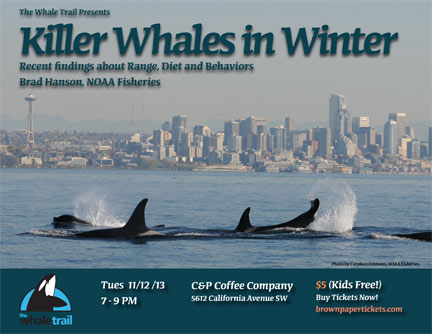Nov 2013
Seal pup finds refuge on West Seattle beach
Nov/26/13 06:13 AM
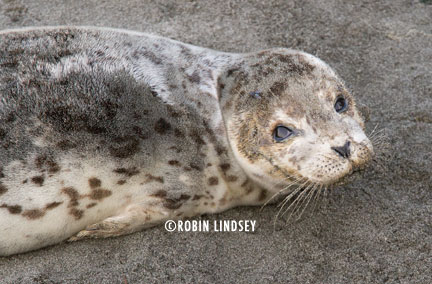
Just after sundown and a little before high tide, a spotted seal pup has been wriggling ashore on a West Seattle beach to seek shelter. The pup was fist reported Wednesday evening on the sand beneath a bright moon and has come ashore like clockwork every evening since, except Saturday. Each evening, first responders would block off the entrance to the tiny beach and the grassy area above the pup, nicknamed Moonshadow, so that he could sleep undisturbed. And each morning, just before sunrise, Moonshadow would return to the cold waters of Puget Sound after a 12-hour rest (normal behavior for seal pups).
That is, until yesterday. The pup showed no interest in returning to the water to forage early in the morning. Instead, as the tide inched closer, Moonshadow inched further up on the sand. Volunteers stood watch in two-hour shifts, talking with the public and informing folks that winter months are a struggle for seal pups. Almost all pups this time of year are battling lungworm and tapeworm loads which often lead to viral infection. Rest is critical to help boost the weaned pup’s immune system and help fight off disease.
Moonshadow finally, and somewhat reluctantly, crawled towards the water around 4pm, rested a bit more and then swam off in the approaching darkness - after resting approximately 22 hours. Volunteers removed the tape perimeter and discussed concerns about his health.
Sometime late last night or in the morning’s wee predawn hours, Moonshadow came ashore again. He was sleeping soundly when Seal Sitters’ first responder arrived at 6am. The incoming tide swept over his flippers around 8 and the pup swam off in search of breakfast. There were fresh human and dog prints on the small beach. Please remember that dogs are NOT ALLOWED on Seattle beaches - leashed or unleashed. They are an inherent danger to vulnerable seal pups who are unable to move quickly on land - additionally, disease can be spread between species. An off-leash dog is reported to have mauled and killed a seal pup in Everett earlier this season.
We fully anticipate that Moonshadow, who may be suffering from an ear infection and parasite load, will be back today. Volunteers will continue to monitor his health. Please call Seal Sitters’ dedicated hotline (206-905-SEAL) if you see a pup or other marine mammal onshore.
PUPDATE
11/27/13 2:21pm
Moonshadow came ashore at 6:05pm last evening, returning to the water to forage at 8:15am this morning. We anticipate he will return to this safe haulout again tonight. Continued long periods of uninterrupted rest will help strengthen Moondshadow’s immune system, compromised by lower body weight and colder weather. Seal Sitters volunteers will continue to keep a close eye on his health.
11/28/13 Thanksgiving Day
Seal Sitters’ first responders captured Moondshadow and transported him to PAWS for stabilization and treatment. The pup’s health had been declining over the past couple of days, but due to tides and the pup’s position on the beach, we had not been able to ensure a successful capture until early this morning.
Seal pup rescued by Seal Sitters returns home to Puget Sound
Nov/25/13 10:51 AM
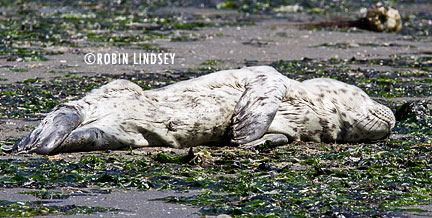
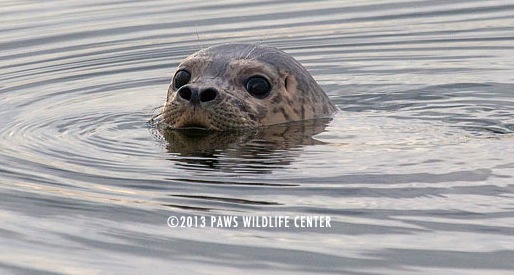
We are thrilled to report that Snapper weighed a whopping 73 lbs when released - a true blubberball. This fat layer will help sustain the pup as he learns to forage in the huge expanse of Puget Sound. Huge flipper hugs to PAWS’ dedicated and amazing staff and the Coast Guard!
Sunny day brings seal pup Cloudy to the beach
Nov/09/13 11:01 AM
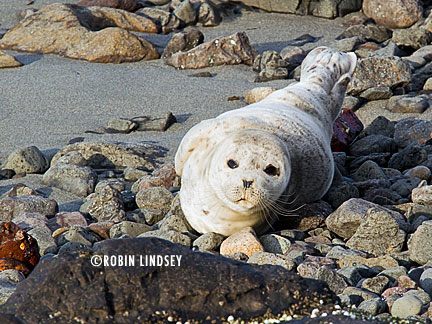
While setting the perimeter, a quick call was made to Lynn S, scheduler for the day. She immediately consulted our online volunteer calendar and called those who had entered time for the late afternoon and evening hours. Shortly thereafter, volunteers Lars, Betty and Ralph showed up for duty with their binoculars and educational materials - ready to protect the pup and educate the public about harbor seal behavior. Next, came Angela and her 9-year-old son Jack eager to help out. The youngster named the pup Cloudy.
Volunteers Theresa, David and Eilene stayed until well after dark. Cloudy returned to the Sound at almost 8 o’clock when the high tide washed over him. The pup was beginning to shiver by that time in the cold air with damp fur. Since weaned pups tend to be on the thinner side with less of a blubber layer to keep them warm, it would be the equivalent of a person being out in the cold with a windbreaker instead of an insulated down jacket.
Cloudy hasn’t shown up yet today, but may reappear this afternoon after a late-morning high tide in excess of 12 feet. Angela reports that Jack woke up early this morning and the first thing out of his mouth was “I wonder if Cloudy came back to the beach?” We certainly hope so - and rest assured that if he does return, volunteers will be protecting him on these busy urban shores.
While scouring the shoreline for signs of pups early this morning, our first responder noticed some derelict net caught in the rocks below the sea wall. We will attempt to remove that today so that this treacherous piece of marine debris can no longer endanger marine wildlife.
UPDATE 2:00pm
Using a rope ladder, first responders Robin and David scaled the sea wall and cut away a substantial piece of “ghost net” that was lodged between the rocks and high cement wall close to where Cloudy rested yesterday. This term refers to a derelict fishing net - a deathtrap that has been lost or cut free by fishermen which drifts through the water, catching and drowning marine wildlife.
If you come across derelict fishing gear, you can report the type and location online through Northwest Straits Initiative’s website here. Countless thousands of marine mammals, sea turtles and sea birds die each year in derelict fishing line, pots and nets. In Puget Sound alone, as of late September, 2013, the Northwest Straits Initiative has “removed 4, 527 derelict fishing nets, 3,081 crab pots and 47 shrimp pots from Puget Sound. More than 323, 000 animals (240 unique species) were found entangled in this gear.” We applaud their tremendous - and often perilous - environmental work.
Orca lecture hosted by the Whale Trail
Nov/07/13 11:08 AM
UPDATE:
THIS EVENT IS SOLD OUT.
The Whale Trail presents Brad Hanson, NOAA Fisheries, at C&P Coffee Company on November 12 from 7-9pm (doors open to public at 6:30). SOLD OUT.
“Killer Whales in Winter – Recent findings about Range, Diet and Behaviors”
Where do the southern resident orcas go during the winter? What do they eat? And how will that information help move this endangered population towards recovery?
Brad Hanson, NOAA Fisheries, will discuss the innovative research techniques that are being deployed to answer these and other key questions. Satellite telemetry and genetic analysis of prey and fecal sampling are providing new information about where the orcas are going, and what they are eating. LIke scientific detectives, Brad and his colleague are solving the mysteries that are critical to the orcas’ survival.
Join us on November 12 to hear first-hand about these research efforts, what the data are showing, and what it means for the long-term recovery of this population.
This is the first in the second series of Orca Talks hosted by The Whale Trail in West Seattle.
The event also features updates from Robin Lindsey (Seal Sitters), and Diver Laura James (tox-ick.org and Puget Soundkeeper Alliance), and photography and art from Judy Lane.
~ text courtesy of The Whale Trail
THIS EVENT IS SOLD OUT.
The Whale Trail presents Brad Hanson, NOAA Fisheries, at C&P Coffee Company on November 12 from 7-9pm (doors open to public at 6:30). SOLD OUT.
“Killer Whales in Winter – Recent findings about Range, Diet and Behaviors”
Where do the southern resident orcas go during the winter? What do they eat? And how will that information help move this endangered population towards recovery?
Brad Hanson, NOAA Fisheries, will discuss the innovative research techniques that are being deployed to answer these and other key questions. Satellite telemetry and genetic analysis of prey and fecal sampling are providing new information about where the orcas are going, and what they are eating. LIke scientific detectives, Brad and his colleague are solving the mysteries that are critical to the orcas’ survival.
Join us on November 12 to hear first-hand about these research efforts, what the data are showing, and what it means for the long-term recovery of this population.
This is the first in the second series of Orca Talks hosted by The Whale Trail in West Seattle.
The event also features updates from Robin Lindsey (Seal Sitters), and Diver Laura James (tox-ick.org and Puget Soundkeeper Alliance), and photography and art from Judy Lane.
~ text courtesy of The Whale Trail
